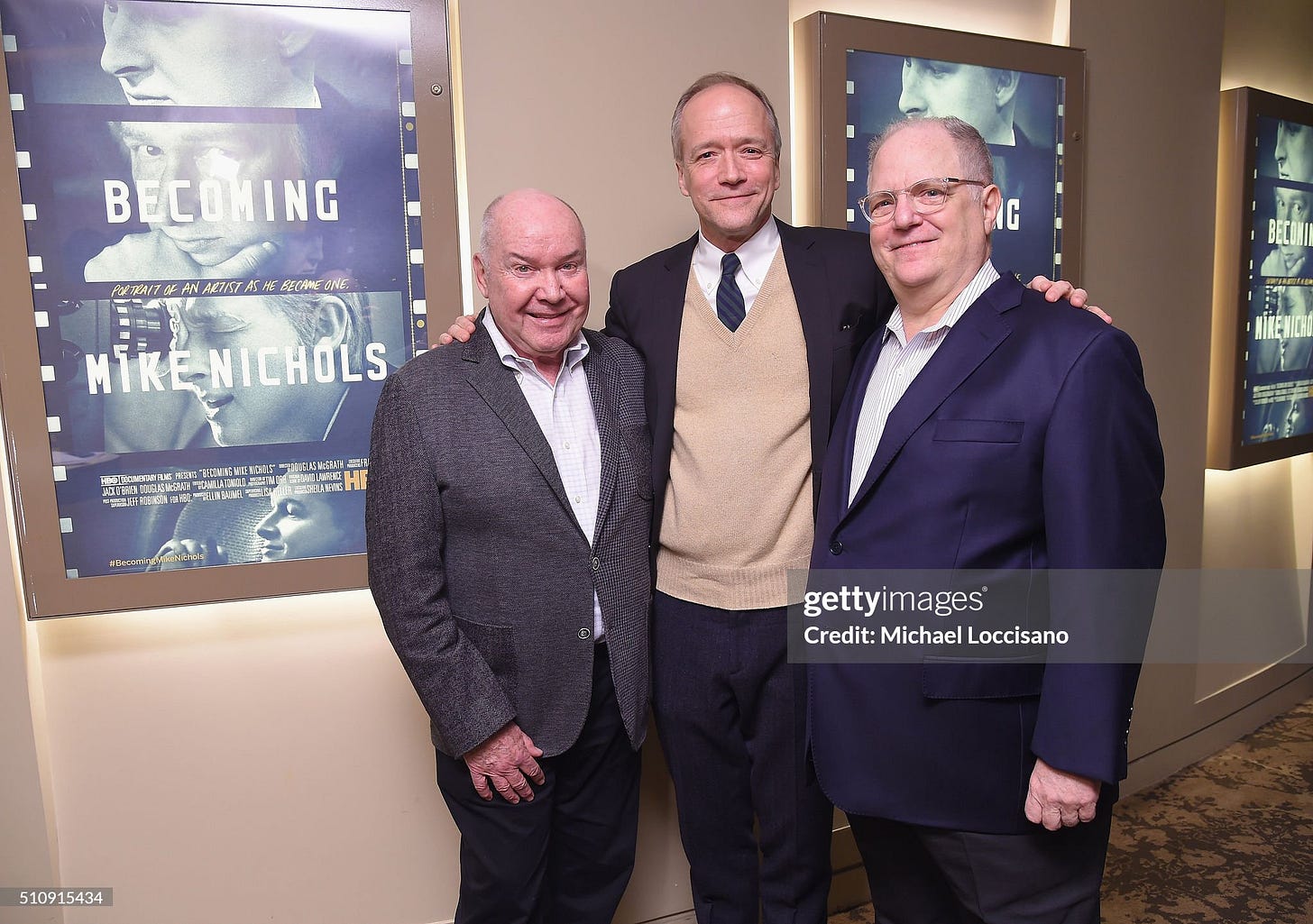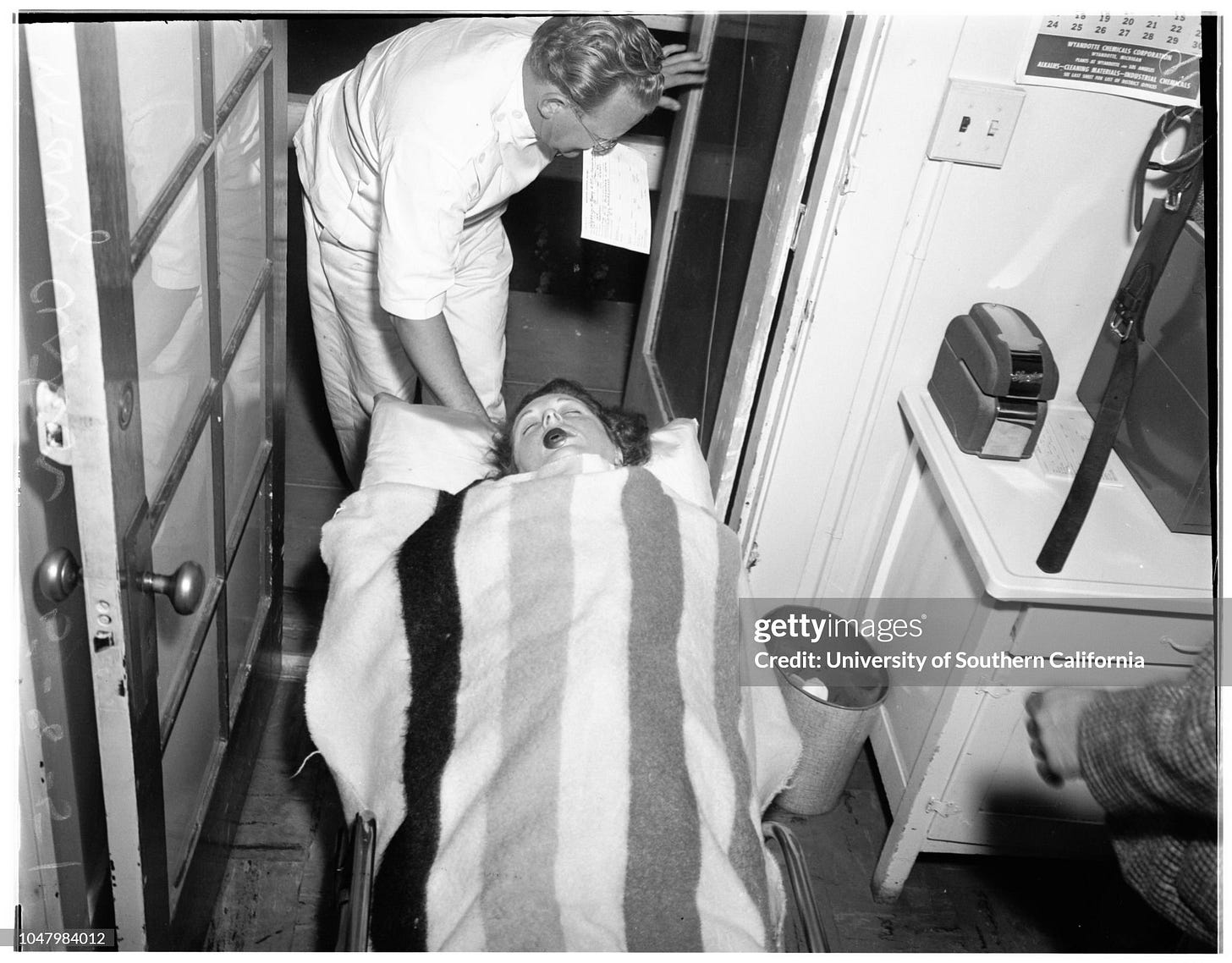Mike Nichols and Douglas McGrath on Critics, Mary Astor, Teeth and Being Positive

Douglas McGrath and I liked to meet at various bars on the Upper West Side. Ultimately, we settled on the Beacon Bar, on Broadway, near both our apartments, but we ventured into others. We invited Mike Nichols to join us one night, and we thought we should be swankier: Bemelman’s Bar at The Carlyle was suggested, and although it was close to Nichols’ apartment, he decided he would rather meet at Doug’s apartment.
Here are some excerpts from that night, in 2012.
++++++++++++++++++++++++++++++++++++++++++++++++++++++++++
Mike Nichols: “Tell me again why you felt compelled to send me the photos of Mary Astor having her stomach pumped?”
Douglas McGrath: “I told him to!”
James Grissom: “Because you doubted that they existed, and, when challenged…”
Mike Nichols: “I don’t recall doubting that they existed. I think I doubted that there was an attendant who looked, as you said, like a young, sexy Orson Welles. I will give you credit, however, for warning me that Astor was not wearing waxed clown lips: We are, you said, and I quote, seeing part of the apparatus.”
James Grissom: “Was I right?”
Mike Nichols: “Well, yeah, although I still can’t find it within me to have, within the same sentence, much less my brain, the idea of “young, sexy Orson Welles.” But, okay, you were right. And it made my email all the more interesting. And my mind still saw clown lips. Why are we saying these things? I loved Mary Astor. I am appalled that these photographs were taken and made public. Why? To shame the suicidal?”
James Grissom: “Someone I met through Molly Haskell is writing about Mary Astor and the diaries, and didn’t know these [photos] existed.”
Mike Nichols: “Well, he’s doing a bang-up job of researching his book, isn’t he?”
James Grissom: “It’s about time for Doug to tell us to be nice.”
Douglas McGrath: “Yes! Be nice!”
James Grissom: “That’s what having Norman Vincent Peale on the front page of your childhood newspaper will do to you.”
Mike Nichols: “Really?”
James Grissom: “I’m making that up, too?”
Douglas McGrath: “He’s telling the truth. I thought I had told you about that…”
Mike Nichols: “You must admit that it is something I would block or expunge..”
Douglas McGrath: “Yes, every morning at breakfast, I read the daily message of Norman Vincent Peale.”
Mike Nichols: “Oh, so sunny, Doug!”
James Grissom: “Why didn’t you want to meet at the bar?”
Mike Nichols: “Well—and we’re going to veer off of Doug’s positivity diet—I couldn’t risk going there a third time and once again bumping into someone I loathe.”
Douglas McGrath: “And both were with me."
James Grissom: “The loathsome people were with you?”
Douglas McGrath: “No! Both times I was there waiting for Mike…”
Mike Nichols: “I run late.”
Douglas McGrath: “…and I was talking to these people and Mike came in.”
Mike Nichols: “Yes. Thank you so much, Doug.”
Douglas McGrath: “I couldn’t just tell them to leave. Besides, I didn’t know you didn’t like them.:
Mike Nichols: “Does anyone like them?”
Douglas McGrath: “I like them.”
Mike Nichols: “Score one for Norman Vincent Peale.”
Douglas McGrath: “I will say that they cornered Mike.”
Mike Nichols: “They did not corner me. They hectored me. They were both full of ideas that only I could bring to life—to fruition—and both featured them prominently. It was like bumping into critics back in the day.”
Douglas McGrath: “Critics? How?”
Mike Nichols: “Oh, not as much now, but there was a time when critics would pull me aside to tell about what they really did. You know, this stint as a critic was just temporary, a means to bring in income while the great novel, play, or symphony was being worked on. The stint becomes, of course, a life sentence, and decay sets in. Old age leaves them less agile to leap across lobbies or parties to talk to me about their true work.”
Douglas McGrath: “We haven’t talked about that before.”
Mike Nichols: “Well, why would we? I really hadn’t thought of it for a long time. I am not the only person who went through this. One night at an opening of something, Arthur Penn and I were talking, and his eyes filled with terror and he told me that a certain critic was approaching. It was a particularly odious one—not on a personal level, really, but a bad novelist—and Arthur and I invented a means of catapulting out of the situation.
“What always amazed me is that some of these critics had been particularly harsh toward me and my work, and there was a remarkable sense of aphasia that swept over them when they asked if they might send me something. They would appear to have no memory of how they sharpened their quills on my shallow talents.”
Douglas McGrath: “What would you do?”
Mike Nichols: “I read one novel. Almost dazzlingly bad. I found a way to say it was beyond me. I’m happy to say that this man has become a good writer of profiles. We do need good writers of and on the theatre, and he acquits himself there. But I soon got out of accepting manuscripts or galleys seeking blurbs. I don’t think I ever said my plate was full, but I grew fond of this chestnut— ‘This is just beyond me. Something I just can’t grasp.’
Douglas McGrath: “In our talks for the film [Becoming Mike Nichols] you did say that you thought critics were sad.”
Mike Nichols: “Well, yeah. You know, there but for the grace…of something. No one—and I assure you I did not originate this claim—ever sets out to become a critic. It’s a mud hole into which you fall, swim around, and ultimately drown. There is so much anger involved in the act of looking upon people who went out and did it, and who now must be reprimanded for not doing whatever it is as you fantasized you might. Is that cloudy enough for you?”
Douglas McGrath: “You did quote Elaine [May] on critics.
Mike Nichols: “Yes, she thought they were the smart kids who made farting sounds in the back of the classroom and tortured the teacher because they had done their homework, perfectly, and were now bored. Or they were sad, shy people with bad teeth. Elaine said all critics had bad teeth. I took this with far too much sensitivity because I am not happy with my teeth. Among other things.”
Douglas McGrath: “Is it that critics don’t get their teeth fixed?”
Mike Nichols; “Elaine thought it went deeper. Elaine thought that the teeth couldn’t be fixed. It wasn’t a matter of straightening or capping: There was something fundamentally wrong with how they were placed within the critic’s head, so their mouths, their method of speaking, was forever altered. Elaine always believed in the fate of our bodies. Messages from our maker were stamped upon us. It is a subject of which I am understandably terrified.”




